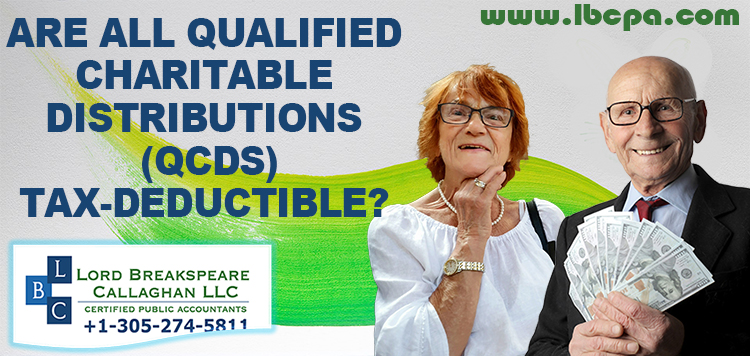LBCPA News 
Click here to go back
Qualified Charitable Distributions Allow Eligible IRA Owners Up to $100,000 in Tax-Free Gifts to Charity

The Internal Revenue Service reminds individual retirement arrangement (IRA) owners age 70½ or over that they can transfer up to $100,000 to charity tax-free each year.
These transfers, known as qualified charitable distributions or QCDs, offer eligible older Americans a great way to easily give to charity before the end of the year. And, for those who are at least 73 years old, QCDs count toward the IRA owner's required minimum distribution (RMD) for the year.
How to set up a QCD
Any IRA owner who wishes to make a QCD for 2023 should contact their IRA trustee soon so the trustee will have time to complete the transaction before the end of the year.
Normally, distributions from a traditional IRA are taxable when received. With a QCD, however, these distributions become tax-free as long as they're paid directly from the IRA to an eligible charitable organization.
QCDs must be made directly by the trustee of the IRA to the charity. An IRA distribution, such as an electronic payment made directly to the IRA owner, does not count as a QCD. Likewise, a check made payable to the IRA owner is not a QCD.
Each year, an IRA owner age 70½ or over when the distribution is made can exclude from gross income up to $100,000 of these QCDs. For a married couple, if both spouses are age 70½ or over when the distributions are made and both have IRAs, each spouse can exclude up to $100,000 for a total of up to $200,000 per year.
The QCD option is available regardless of whether an eligible IRA owner itemizes deductions on Schedule A. Transferred amounts are not taxable, and no deduction is available for the transfer.
Report correctly
A 2023 QCD must be reported on the 2023 federal income tax return, normally filed during the 2024 tax filing season.
In early 2024, the IRA owner will receive Form 1099-R from their IRA trustee that shows any IRA distributions made during calendar year 2023, including both regular distributions and QCDs. The total distribution is shown in Box 1 on that form. There is no special code for a QCD.
Like other IRA distributions, QCDs are reported on Line 4 of Form 1040 or Form 1040-SR. If part or all of an IRA distribution is a QCD, enter the total amount of the IRA distribution on Line 4a. This is the amount shown in Box 1 on Form 1099-R.
Then, if the full amount of the distribution is a QCD, enter 0 on Line 4b. If only part of it is a QCD, the remaining taxable portion is normally entered on Line 4b.
Either way, be sure to enter "QCD" next to Line 4b. Further details will be in the instructions to the 2023 Form 1040.
Get a receipt
QCDs are not deductible as charitable contributions on Schedule A. But, as with deductible contributions, the donor must get a written acknowledgement of their contribution from the charitable organization before filing their return.
In general, the acknowledgement must state the date and amount of the contribution and indicate whether the donor received anything of value in return. For details, see the Acknowledgement section in Publication 526, Charitable Contributions.
For more information about IRA distributions and QCDs, see Publication 590-B, Distributions from Individual Retirement Arrangements (IRAs).
If you have any questions regarding Essential Business Accounting, Domestic Taxation, International Taxation, IRS Representation, U.S. Tax Implications of Real Estate Transactions or Financial Statements, please give us a call at +1-305-274-5811.
Source : IRS






